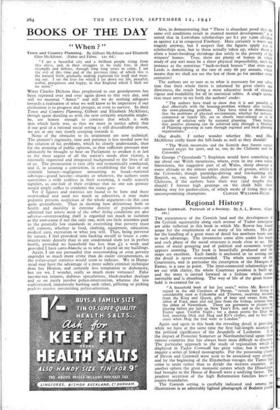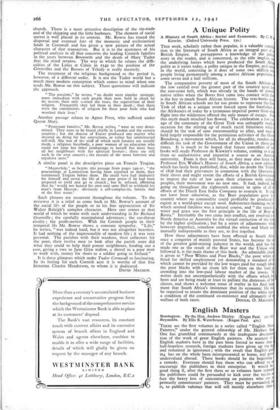Regional History
THE separateness of the Cornish land and the development of the Cornish squirearchy along each avenue of Tudor enterprise are alike reflected in this book in which Mr. Rowse has found scope for the employment of so many of his talents. His gift for the handling of a great mass of detail has nowhere been seen to such advantage. The inventories come alive under his touch and each phase of the social structure is made clear to us. His sense of social grouping and of political and economic weight appears unerring. The book is beautifully produced and the maps are excellent. Each family is anchored in its setting and the detail is never overcrowded. The whole account of the Courtenays, and in particular the description of the Marquis of Exeter, is a case in point. The inter-connected relationships are set out with clarity, the whole Courtenay position is built up, and the story is carried forward in a fashion which seems inevitable and is absorbing. The way of life of the great house- hold is re-created for us.
"A household book of her last years," writes Mr. Rowse in regard to the old Countess of Devon, "reveals her living in considerable state at Cokombe and Tiverton, receiving nresena from the King and Queen, gifts of boar and swans from the abbot of Ford, oxen and red deer from the bishop, salmon from the abbot of Newenham. There are payments to players for playing before my lady on New Year's Eve, and to the waits of Exeter upon Twelfth Night ; for a dozen points for Dick the fool, mending Dick and Mug and Kit's clothes, and to buy two coats when Mug the fool went to London."
Again and again in this book the revealing detail is provided, while we have at the same time the first full-length account d the political significance of the Arundells of Lanheme. It it the impact of Protector Somerset or Northumberland upon these remote countries that has always been most difficult to discover. The particular approach to the study of regionalism which IS displayed in Tudor Cornwall has great value, but it tends to require a series of linked monographs. For the possessing classes of Devon and Cornwall were soon to be associated very closelY, and by the beginning of the Elizabethan voyages the Tamar had come to unite rather than to divide the western counties. In another sphere the great monastic estates which the Dissolution had brought to the House of Russell were a unifying factor. The prudent accretion of the high Reformation families knew un county-boundaries.
The Cornish setting is carefully indicated and among the illustrations is an admirably lighted photograph of Bodmin Parish church. There is a most attractive description of the tin-trade and of the shipping and the little harbours. The element of social unrest is well placed in its context. Mr. Rowse has traced the dispersal and eventual fate of the monastic and ecclesiastical lands in Cornwall and has given a new picture of the actual character of that transaction. But it is to the acuteness of his political analysis in all that concerns the leading Cornish families in the years between Bosworth and the death of Mary Tudor that the mind returns. The way in which he relates the diffi- culties of the Lisles at Calais in 1540 to the position of the Grenvilles and the Bassets of Tehidy is really masterly.
The treatment of the religious background to the period is, however, of a different order. It is not the Tudor world but a much more modern conception which comes to mind when one reads Mr. Rowse on this subject. Three quotations will indicate the approach.
"The passions," he writes, "no doubt were simpler stronger, more immediate with such people than now, held in check by no reason, their only control the tears, the superstition of their religion. Frequently they led them ta their death ; then there were the consolations of religion for these poor fools who had wrecked their lives.'
Another passage relates to Agnes Prest, who suffered under Queen Mary.
"Protestant fanatics," Mr. Rowse writes, "were so very deter- mined. They were to be found chiefly in London and the eastern counties ; but the diocese of Exeter produced one martyr who insisted on dying for her convictions, or rather her uninstructed self-will. She was of the stuff of which such fanatics are usually made, a religious busybody, a poor woman of no education who could not keep her inner prompungs to herself but must bore all her neighbours with her spiritual favours ; there are still such in the west country ; the recruits of the more fantastic and repulsive sects."
A similar panel is the descriptive piece on Francis Tregian.
"Meanwhile," so begins this passage from pages 349-50, "the proceedings at Launceston having been reported to them, they summoned Tregian before them. He could have had immunity fix himself and saved the life of iris poor priest .if he had been prepared to yield and go to church ; but he refused, affirming that he 'would not hazard his own soul unto Hell to withhold his man's from Heaven: obviously a self-complacent, fanatic fool of the first water.'
Such phrases are recurrent throughout the volume. To the reviewer it is a relief to come back to Mr. Rowse's account of the social life of the people or to his fine appreciation of Sir Walter Raleigh's complex character. Here one comes to that world of which he wrote with such understanding in Sir Richard Grenville; the carefully manipulated adventure ; the cut-throat rivalry ; the profit-motive. With the Cornish people in their temporal ills Mr. Rowse shows a constant sympathy. "Life," he writes, "was indeed hard, but it was not altogether heartless. It had nothing of the impersonality of modern life ; it was very personal. The parishes with their wardens, their collectors for the poor, their twelve men to look after the parish store did what they could to help their poorer neighbours, lending out a cow, giving a ewe to Jane Glyn widow, a shovel to a poor man to work with, money for shoes to a soldier going to Ireland."
It is these glimpses which make Tudor Cornwall so fascinating. In its feeling for each Cornish acre it is worthy of that fine historian Charles Henderson, to whom it is dedicated.
DAVID MATHEW.



























 Previous page
Previous page